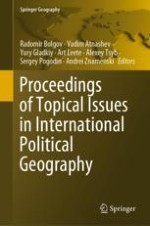This proceedings book addresses the main issues of contemporary political geography and international relations, providing a platform for discussion and collaboration of experts in the fields of Political Geography, Geopolitics, International Relations, etc. Participants from all over the world consider the controversies and challenges posed by globalization, focusing, in particular, on the ideologies of globalization and regionalism, migration crises, prevention of ethnic conflicts, and measures to promote sustainable development. The content of the book may be interesting to expert community, academics and popular audience.
